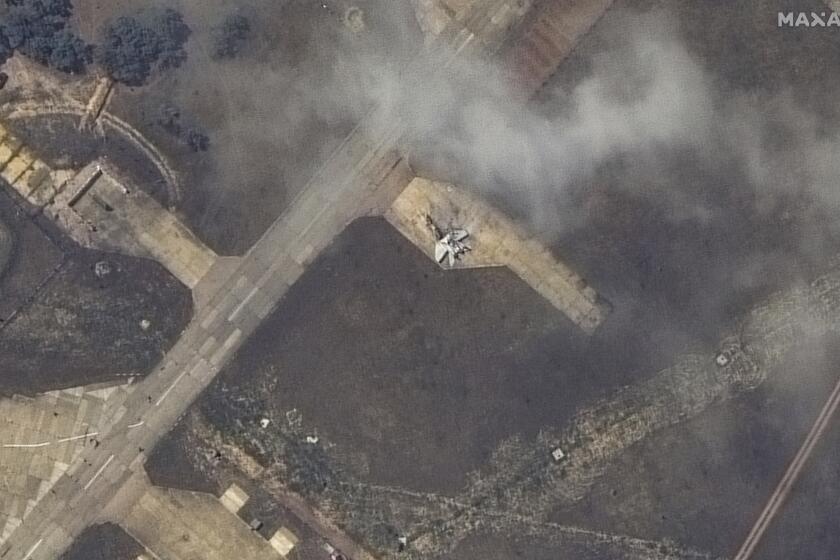Libya Targeting of U.S., Israeli Interests Told
Libyan-supported agents in Europe and the Middle East--and around the world, according to one source--have been told to prepare to attack American and Israeli targets in the wake of the clashes between Libyan and U.S. forces in the Gulf of Sidra region last week, Reagan Administration officials said.
Intelligence reports reaching Washington warned that such orders had been dispatched, although specific targets and the timing of attacks remained unclear, the officials said.
With the U.S. 6th Fleet ships that took part in the military action dispersed in the central Mediterranean, the Pentagon and other arms of the government turned their attention over the weekend to the possibility of terrorist attacks.
Concern about such attacks led to the cancellation of at least two overseas congressional trips during the Easter holiday. However, Vice President George Bush is holding to a plan to visit four Mideast nations--Bahrain, Yemen, Oman and Saudi Arabia--during Easter week, and Defense Secretary Caspar W. Weinberger plans to embark Monday on a two-week journey to South Korea, Japan, Thailand, the Philippines and Australia.
One Administration official, who spoke on condition that he not be named, said the identities of the Libyan agents are unclear but that “there is this corps out there,” linked in at least a loose fashion to the radical Red Brigades in Italy and the remnants of the Baader-Meinhof organization active in West Germany in the 1970s, as well as to a left-wing organization tied to terrorist activities aimed at North Atlantic Treaty Organization sites in Belgium.
Another senior Administration official, who asked for anonymity, said Saturday that while he is unaware of such connections between Libya and the established terrorist groups in Western Europe, “we definitely have a terrorism threat worldwide.”
Palestinians, Europeans
A third official said the terrorists had apparently developed contingency plans for operations and that there were intelligence reports that Libya had recruited Palestinians to carry out operations.
The use of Palestinians, rather than Libyans, to conduct terrorist actions would make it “tougher to finger who did it,” he said. Similarly, the use of Europeans would also make it more difficult to tie Col. Moammar Kadafi, the Libyan leader, to the terrorism.
President Reagan said Saturday that the clash of Navy ships and planes Monday and Tuesday with Libyan forces “was a direct military confrontation, provoked by Libya’s dictator, Col. Kadafi, who usually prefers to arm, train and direct terrorists who gun down helpless civilians--for example those terrorists who killed . . . civilians last December at the Rome and Vienna airports.”
U.S. officials have said that the Palestinian splinter group led by Abu Nidal was responsible for the airport attacks and received Libyan support.
“But last week Col. Kadafi tried his luck with some people who could actually defend themselves--United States armed forces, our 6th Fleet,” Reagan said in his weekly radio address, delivered from his ranch in the mountains above Santa Barbara, where he is spending the Easter holiday.
‘Line of Death’
The clash occurred after U.S. ships and aircraft began operations south of the “line of death” Kadafi declared at the mouth of the Gulf of Sidra, a disputed inlet of the central Mediterranean. The Libyan leader claims the entire gulf, stretching approximately 150 miles north from the farthest point of the North African nation’s coastline, as Libyan territory, while the United States recognizes a line 12 miles offshore as the international boundary.
After the American forces--including a cruiser, two destroyers and aircraft of three U.S. carriers--crossed the line into the gulf, Libyan forces fired at least four surface-to-air missiles at the planes, prompting U.S. attacks on a Soviet-supplied missile-targeting radar facility, officials said. At least two Libyan missile patrol boats were sunk, too, after demonstrating hostile intentions, according to the U.S. officials.
In Tripoli, the Libyan capital, Kadafi suggested at a rally Friday evening that Spain and Italy could be at risk because they provide bases for the U.S. 6th Fleet, which patrols the Mediterranean.
Those nations and “any other country in which the 6th Fleet is based will be considered party to the war” in the event of further combat, he said.
Regan Sarcastic
Donald T. Regan, the White House chief of staff, expressed a degree of skepticism about public threats Kadafi has made, scoffing at the melodrama and saying “get out my violin.”
At a lunch with a group of reporters in Santa Barbara, he said Saturday: “In dealing with terrorists, it’s well not to overestimate their power. But you can’t brush it aside. You have to be cautious.”
Responding to a report in The Times that, according to Administration officials, the foray into the Gulf of Sidra was intended by Secretary of State George P. Shultz and national security adviser John M. Poindexter to draw Kadafi into an exchange of fire with U.S. forces, Regan said the President had not tried to provoke such action.
Kadafi’s public threats appeared to be supported, at least in general, by information obtained by the U.S. government through intelligence channels. These included reports by individuals and from electronic interception of Libyan communications, which assisted U.S. officials in keeping track of Kadafi and Libyan intelligence activities during the confrontation.
“It’s hard to say any specific order went out from Kadafi’s palace but . . . there are Libyan-trained, Libyan-sponsored cells throughout the Middle East and Western Europe which have been told to get ready to zap American (and) Israeli targets,” an Administration official said.
Alerts on Both Sides
“Our diplomatic posts and military people have been given a heads-up,” he said.
Another official stated: “I have heard they’ve told their agents worldwide to prepare for attacks on American targets and interests.”
“It’s clear they have alerted . . . people under their influence, and agents, either to take action against the United States or be prepared to do that,” he said.
“That’s why there have been a lot of precautions,” he said, citing the cancellation of the congressional trips.
Times staff writer Eleanor Clift contributed to this report from Santa Barbara.
More to Read
Start your day right
Sign up for Essential California for news, features and recommendations from the L.A. Times and beyond in your inbox six days a week.
You may occasionally receive promotional content from the Los Angeles Times.







